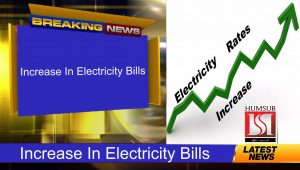Increase In Electricity Bills
Increase In Electricity Bills: The National Electric Power Regulatory Authority (Nepra) has approved a hike of Rs0.20 per unit in the tariff of all power distribution companies, except for K-Electric, on account of fuel cost adjustment for September 2018.
The increase came after the cost of fuel went up in September while power consumers paid lower tariffs. The tariff revision would help recover the lost amount, the regulator said.
Ex-Water and Power Development Authority (Wapda) distribution companies would collect the additional Rs0.20 per unit in the electricity bills in November 2018. They would receive an extra Rs2.4 billion from electricity consumers in next month’s bills as a result of the tariff adjustment.
Power distribution companies include Faisalabad, Gujranwala, Hyderabad, Islamabad, Lahore, Multan, Peshawar, Quetta, Sukkur and Tribal Areas electricity supplying firms.

The tariff rise, however, will not be applicable to lifeline consumers who consume up to 50 units in a month and K-Electric consumers. Nepra took the decision at a public hearing on Wednesday of a petition filed by the Central Power Purchasing Agency (CPPA) on behalf of the power distribution companies.
The CPPA, in its petition, sought a tariff increase of Rs0.44 per unit for September 2018. It told the regulator that the actual cost of electricity generation came in at Rs5.566 per unit compared to the reference fuel cost of Rs5.1217, showing an increase of Rs0.444 per unit. Responding to that, Nepra members said had the rupee not been depreciated, the consumers could have got a relief of Rs0.30 per unit.
The rupee’s weakness put an additional burden of Rs8 billion on the consumers, they said and pointed out that if more electricity was generated from coal and re-gasified liquefied natural gas (RLNG), the consumers would have received additional relief.
The CPPA purchased 1.93 gigawatt-hours (GWh) of electricity from high-speed diesel-based plants in September 2018 at a cost of Rs12.049 per unit. It bought 1,024.8 GWh from residual fuel oil-fired plants, which accounted for 8.17% of the total generation, at Rs15.51 per unit.
The cost of electricity based on RLNG came in at Rs9.9327 per unit and its share was 22.68% in the total generation in September. From this source, 2,847.33 GWh of electricity was produced in the month. Generation by hydroelectric power plants stood at 4,279.5 GWh, accounting for 34.09% of the total generation during the month.
The cost of electricity generated by consuming domestic gas was Rs4.8536 per unit and its total share in electricity generation was 15.78% or 1,980.34 GWh.
Coal-fired power plants produced 1,149.17 GWh, accounting for 9.16% of the total generation at a cost of Rs6.485 per unit. Nuclear power plants generated 681.93 GWh of electricity with 5.43% share in total generation at a cost of Rs0.9693 per unit, which was the cheapest amongst all fuel sources.
Pakistan imported 47.07 GWh of electricity from Iran at Rs11.5709 per unit in the month. From bagasse, 79.79 GWh was generated at a cost of Rs6.2089 per unit and from wind and solar sources 342.35 GWh and 64.38 GWh respectively were produced.
For More Information & Videos Subscribe To Our YouTube Channel

